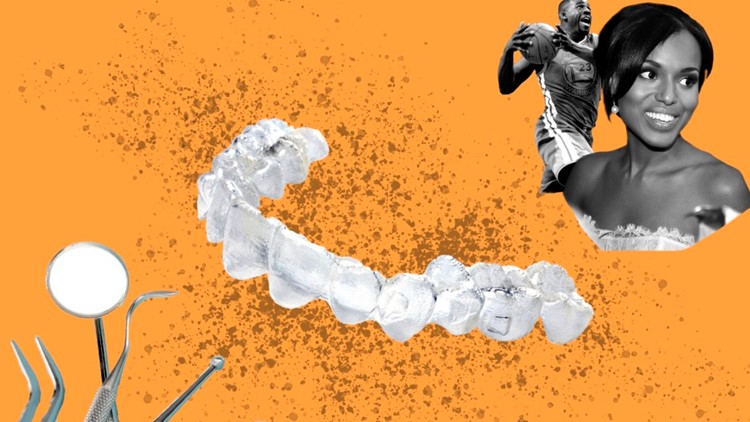CALIFORNIA, USA — In the latest California clash between a legacy industry and a “disrupter,” score one for the upstart: Lawmakers rejected efforts to more aggressively regulate teledentistry companies selling at-home teeth straightening treatments.
But both sides, and their well-paid lobbyists, say they expect the battle to continue next year.
Fueled by venture capital and celebrity backers, companies such as SmileDirectClub, Byte and Candid are challenging the long-held territory of dentists and orthodontists. The newcomers portray their services as a more affordable and faster option than traditional braces, making straighter teeth more affordable for more people. SmileDirectClub, for example, charges about $1,895 for a course of treatment. Braces placed by an orthodontist can cost upwards of $5,000, according to the American Association of Orthodontists.
But dentists and orthodontists contend that teledentistry startups engage in the unlicensed practice of dentistry and give consumers little recourse if treatment goes awry. They say they have seen nerve damage, cracked and loosened teeth, and receding gums in customers who have used the at-home kits.
Their battle echoes other recent California attempts to regulate new businesses who don’t play by old rules — notably its effort to force ride-share companies Uber and Lyft, which have upended the heavily regulated taxicab industry, to treat their gig workers as employees.
Other states are weighing laws or regulations addressing teledentistry start-ups, including Idaho, Washington, Utah and New Mexico.
California’s dentists and orthodontists are regulated by the state dental board, while most teledentistry companies are not. These traditional providers are a well-financed political force, with a track record of altering or quashing legislation affecting their businesses.
But their usual lobbying prowess did not help them this time.
On Saturday a state Senate committee killed Assembly Bill 1998, which would have added new consumer protections and built on existing California law requiring dentists and orthodontists to review X-rays of patients’ teeth before providing certain orthodontia treatments. An earlier version of the bill required an in-person visit, but that requirement was scrapped amid the pandemic.
The bill by Democratic Assemblymember Evan Low of Cupertino had the support of the California Dental Board, the state associations of dentists and orthodontists, and the American Association of Orthodontists.
Amid a national debate about systemic racism, the teledentistry industry cast the idea of further regulations as a misguided move that would reduce access to dental care for low-income and marginalized people. A group called the Coalition for Affordable Dental Access lists minority advocacy groups including the California NAACP, the Black Chamber of Commerce, the Latin Business Association and the National Asian American Coalition as opposing the bill.
Golden State Warriors basketball star NBA Draymond Green, who has invested in SmileDirect, and actress Kerry Washington, who invested in Byte, weighed in.
Green aimed a July 17 tweet at Low, saying he was “giving a handout to dentists on the backs of poor people.”
Washington sent an opposition letter to a state senator overseeing the bill in committee: “Our systems have failed to provide equitable access to oral care,” she wrote, and if the bill passes, “these groups will continue to be underserved.”
In a CalMatters opinion piece, California NAACP president Alice A. Huffman mentioned SmileDirect’s teledentistry platform, writing: “now, more than ever, the African American community needs as many options as possible to close the disparity gap for oral health care. With straighter teeth, it is easier to secure employment, promotions and feel more self-confident.”
The teledentistry industry also argued against California lawmakers getting directly involved in dental care decisions.
“The Legislature should not be making clinical decisions and taking (them) out of clinicians’ hands,” said Susan Greenspon Rammelt, chief legal officer and executive vice president of business affairs for Nashville-based SmileDirectClub, which led opposition to the bill.
Companies such as SmileDirect and Los Angeles-based Byte don’t provide basic oral care, such as teeth cleaning or treating cavities. They typically sell clear, removable dental aligners directly to teen or adult consumers to straighten teeth. Consumers can visit a retail outlet to have their teeth scanned, or use a company-provided putty-and-tray kit to take an impression of their teeth at home. Dentists and orthodontists hired by the companies review the scans, create treatment plans and monitor customers’ progress, but do not examine consumers directly.
Low’s bill would have required all dental providers — remote or otherwise — to maintain patients’ dental records for up to 10 years, and to disclose the name and contact information of the treating dentist. It would have banned providers from asking patients or dentists who work with teledentistry companies from signing any “gag order” agreements that would prevent them from filing complaints or providing information to the state dental board, which regulates dentists and orthodontists.
The most contentious provision: In effect it would have required providers to order new X-rays if consumers couldn’t produce them.
Some teledentistry companies merely ask consumers to attest that they’ve seen a dentist and had x-rays taken. Instead of X-rays, they may perform a three-dimensional scan in their retail shops. During the pandemic, however, some direct-to-consumer aligner companies have relied on at-home teeth impression kits when manufacturing customers’ aligners.
X-rays are important for diagnosing root issues, bone disease or oral cancers that could complicate or rule out teeth-straightening orthodontia, according to the American Association of Orthodontists. They also could add up to hundreds of dollars to the cost of aligner treatment.
The bill would not have affected traditional teledentistry programs serving rural areas, in which dentists remotely supervise and support dental hygienists and other paraprofessionals providing basic preventive care, such as teeth cleaning and cavity treatment, in community clinics.
Gustavo Lopez Jr., a business operations analyst for UCLA Health, said SmileDirect’s aligners worked well for his 17-year-old son, Gus Lopez III, who had a few mildly crooked teeth. The younger Lopez said he experienced minor pain during the six-month process, but he was still pleased.
“I saw so much change, I thought it looked great,” he said. His father said he had asked the family dentist about braces and aligners but chose SmileDirect because it cost about one-third of the dentist’s estimate, and because a friend had good results.
While many customers are pleased with their new smiles, media reports have highlighted patients’ complaints of misleading sales tactics, cracked teeth and even nerve damage from direct-to-consumer orthodontics. The Better Business Bureau lists 2,553 complaints against SmileDirect since 2014 even as customers rated the company, on average, four of five stars.
A Southern California woman named Kelly said an orthodontist X-rayed her teeth and cleared her for aligners, but that she opted to save money by using SmileDirect to close gaps in her front teeth. The result: intense pain that lasted for two weeks after she removed the aligner, she noted on a private Facebook group for people who have had problems with SmileDirect.
“This was hot searing pain where I only could eat soft things like soup or applesauce. I thought if I put these things back on, I’m going to lose my teeth,” Kelly, who asked to use her first name because she is seeking a refund, told CalMatters in a telephone interview. She provided emails documenting her communications with SmileDirect. “I thought at first, I’m saving so much money and it’s working so well. It’s when things go bad that you have no real support and no backup.”
Kelly said SmileDirect agreed to her refund, but sent her a release form that would prevent her from publicly sharing her experience or filing a complaint with any government agency, including the California Dental Board. She is considering whether to sign it, but says she feels “blackmailed.”
Rammelt, the SmileDirect attorney, said via email it is the consumer’s “choice to sign the form of general release if they are seeking a refund outside of our policy, and even then they have the ability to refuse it or strike that paragraph.”
North Bay orthodontist Katie Baker said she’s seen what happens when consumers have bad outcomes with mail-order aligners: cracked teeth, a misaligned bite, receding gums.
“There are many cases that should not have been treated from the start because of poor oral health,” said Baker, president of the California Association of Orthodontists.
Low, who represents part of Silicon Valley, rejected arguments that the bill would disproportionately harm people of color.
“You wouldn’t get LASIK on your eyes without going to an ophthalmologist to see if you’re a candidate,” Low told CalMatters before his bill died in committee. “I support the innovation economy, but my motivation is consumer protection. The facts speak for themselves, versus the ‘tech bros’ that are willing to make a buck on the backs of people of color. These communities should not get subpar treatment.”
Low’s uncle is an orthodontist – something Low’s critics have highlighted.
In the 2019-20 California legislative session, SmileDirect spent more than $184,000 on lobbying to promote its interests, according to California Secretary of State data. In comparison, the California Dental Association spent more than $1.4 million on lobbying for various bills in the same time period.
SmileDirect, valued at $6.4 billion just after going public in 2019, has sued dental boards in California, Alabama and Georgia, alleging that they violated antitrust and commerce laws, according to a recent filing with the Securities and Exchange Commission. In July, a federal judge in the Central District of California dismissed the company’s lawsuit against California’s dental board; SmileDirect filed a notice of appeal.
Shortly after SmileDirect sued California’s dental board last year, the board filed its own accusation against Smile Direct’s lead dentist, Jeffrey Sulitzer. The dental board’s accusation contends Sulitzer violated state law in setting up offices throughout the state for SmileDirect, which isn’t licensed to practice dentistry or provide health care in California, and committed “gross negligence” in providing aligners to patients without fully examining them.
Shortly after SmileDirect sued California’s dental board last year, the board filed its own accusation against Smile Direct’s lead dentist, Jeffrey Sulitzer. The dental board’s accusation contends Sulitzer violated state law in setting up offices throughout the state for SmileDirect, which isn’t licensed to practice dentistry or provide health care in California, and committed “gross negligence” in providing aligners to patients without fully examining them.
Rammelt, SmileDirect’s top attorney, told CalMatters that the accusation is “without merit” and that the offices are owned by Sulitzer’s company, not SmileDirect. The offices are called “SmileShops” and bear the SmileDirect name. The case is pending.



